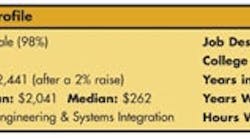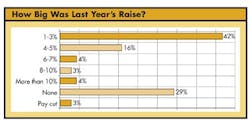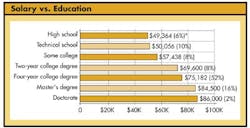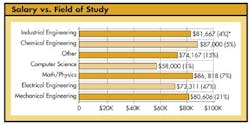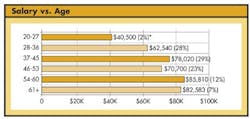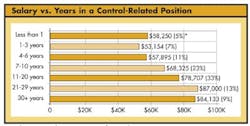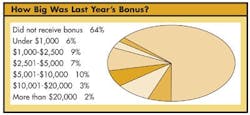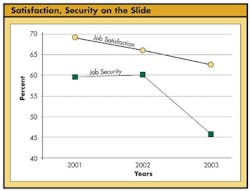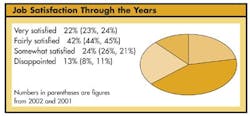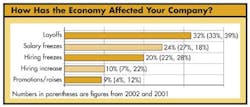"Even though the company is vulnerable, I do not feel concerned because I believe I could go elsewhere and do at least as well," wrote one respondent in 2001. "We didn't lay anybody off, but we had to make work," said one in 2002.
Now they say: "I'm tired of hearing that we have no money. And it's never a good time for a vacation." Or: "We're promised advancement and salary increases, but neither is available." And: "Salaried employees are being forced to take time off without pay, verbally promised management positions are not happening, and I've had three managers in the past three months."
Do we sense a little frustration out there? "My boss tells me monthly that I am a commodity, yet insists that I work evenings and weekends to show my loyalty. How dumb do I look?"
Sure the above 37-45-year-old New York man making textile machinery talks a tough game, but he's still working evenings and weekends. Maybe that's because perhaps the biggest change from previous surveys was the response to a question about job security. While about 60% felt secure in their jobs in both 2001 and 2002, only 46% responded positively this year. More than half are worried.
A similar message emerges from a question on job satisfaction. The two more positive answers, "very satisfied" and "fairly satisfied," continue downward trends--22% and 42% respectively this year, versus 24% and 45% in 2001. The melancholy "somewhat satisfied" and "disappointed" responses scored 24% and 13% respectively, both higher than the 2001 figures.
This year's report is full of contradictions. Since we have no control over who returns our survey each year, this year's group reported only a 2% raise, yet the average (mean) salary compared to last year's group moved up 9.5%, to $72,441. It might be better to compare medians: This year's midpoint was $67,444, just 4.8% above last year's median. Seems this year we had significantly more respondents with incomes above $100,000,22 versus 10 in 2002.
Raises in the past year were skimpy and rare. About 68% got some kind of increase (compared to 70% last year and 86% in 2001), but more than half of those were in the minimal 1-3% range. The higher raise categories all had fewer responses than in past years.
Education definitely pays off. This year's response had a perfectly linear ascension through the levels of education, with more than half of our readers having bachelor's degrees and earning $75,182. A high school education only pays $49,364, but a doctorate gets you $86,000.
All of our readers are involved in the design of control systems for machine builders and other segments in the industrial original equipment manufacturing sector. While that job does not require an engineering degree, most of our readers apparently are engineers. In fact, 67% of our respondents reported having engineering degrees, 6% are degreed in or math and physics, and just two come from computer science; 13% have other college degrees. But 23% do not even have two-year college degrees.
Electrical engineers comprise the biggest group (47% of those respondents with college degrees), and they make just slightly above the average: $73,311. The scant ChemEs make the most ($87,000) followed closely by math and physics majors ($86,818), and less closely by industrial engineers ($81,667) and mechanical engineers ($80,606). Although only 20% of our respondents are licensed professional engineers, they command an average of $83,743, $14K more than everyone else.
But that's where the nice, linear progressions end. Cross-tabulating salary with age gives youngsters (age 27 and under) just $40,500 on average, but that quickly jumps to $62,540 for the next age group. There's a slight dip for those 46-53 ($70,700 average), a jump to $85,810 for the next group, then a smaller dip for those 61 and older ($82,583).
When comparing salary with years at your present company, things jump around until you hit 21 years of seniority. For the second year in a row, those with 6-10 years of seniority actually were at the low end of the salary spectrum, earning $66,308. Check-off categories of 0-2 and 2-5 years were earning $4,000 and $6,000 more, respectively, suggesting there may have been some job-jumping and maybe even a little talent shortage in the recent past. Those with 11-20 years earned $71,618, still less than the average, although there was a big jump to nearly $91,000 for the next group.
Which brings up another observation: The "number of years with your present employer" has gone down through the brief history of this survey, from an average of 11.5 years in the 2001 poll to 11.3 last year to 10.1 years this year.
On the other hand, hours worked per week continues a slow climb, from 45.3 hours in 2001 to 45.6 last year to 45.9 this year. All that work does seem to pay off, however. Those working under 40 hours earn $58,654, compared to $71,967 for those in the 41-50 hours category, $86,286 in the 51-60 hours group, and $94,000 for those clocking more than 61 hours a week.
Despite all the talk that pay and job satisfaction are not connected, consider that the average income of the "very satisfied" group was $92,974, that of the "fairly satisfied" group was $72,189, those "somewhat satisfied" make $60,238, and the "disappointed" ones earn $61,348.
As usual, respondents were overwhelmingly male (98%) and they earned $72,799 compared to the $55,500 average brought in by the small group of women.
Also not surprising, company management is the highest-paying job category at $80,633, and this 16% share of our readership was the only group above the average. The small group in research and development, which usually scores better, brought in just $66,400 on average, a few dollars under tech support ($66,778) and further behind engineering design, our biggest group (53%) at $70,265. Machine assembly was at the bottom: $43,000.
Even highly paid managers complain. "I work long hours six days a week," wrote a 37-45-year-old MBA at a Connecticut machine tool company. But he's making more than $140,000 after a 4-5% raise and got a bonus of better than $20,000. Yeah, there are jobs like that out there.
If you planned on making up for low pay with a hefty bonus, you planned wrong. Nearly 64% of you got nothing--that's the most people to get stiffed in the three years of this survey. Other bonus figures are in a table, but it's worth noting that while the mean was $2,041, the median was just $262.
For the few who got one, the basis for that bonus was cost reduction 42% of the time; 30% got one for innovation, 21% for finding new customers, and about 8% for technical support.
Money Can't Buy Happiness
But it's only money, after all. What's really important is happiness. If that's the case, the news only gets worse.
About 63% of the survey's respondents also included written comments, and negative statements outnumbered good ones by about 8:1. A typical sentiment was: "I am not afraid of my performance affecting job security, but rather the security of the company as a whole."
"The idea of staying with the same firm long term (i.e., more than five years) is dead," says a 37-45-year-old electrical engineer working in research and development at an Illinois engine and turbine builder. He's been there less than five years. "If companies want to cut costs, they need to start from the top down, instead of up from the worker bees."
Many have lost respect for their employers. "Current management does not have a clear path to be competitive. They are striving to survive without employee concerns," notes a 54-60-year-old applications engineer at a Tennessee system integration firm. He took a 6% pay cut this year and also notes he has had to take unpaid time off. "There's a total lack of customer concern. They're more interested in whatever's new and technology instead of customer ease and simplicity," adds a 37-45-year-old man in tech support at a South Carolina industrial HVAC firm.
"While this market [building automation] remains strong and profits are trending upward, there is a strong move by independents in Pennsylvania to keep the added profit for owners and put less back into salaries and benefits." And the author of that was in management. But the 46-53-year-old man also had to endure a 12% pay cut. A 28-36-year-old Colorado systems integrator adds, "Many employers seem to have forgotten to recognize a job well done. The only feedback is negative, resulting in low morale and productivity."
"The secretary makes more than me, the engineer." But the author is a young (20-27) tech school graduate. "We've had low raises and no bonuses for three years now. I was told by management this is an industry standard," says a 28-36-year-old EE in oil and gas field machinery design. "Medical increases cancel any raises I get. I make less take-home now than three years ago, and that is wrong!"
Surprisingly, that was among only two or three comments about the spiraling costs of health insurance, which receives a lot of complaints in surveys from our sister magazines, such as Control.
Perhaps there's all this pent-up frustration because it has been a long time since times were good. "I have not received a salary increase since 2000. Hopefully, the economy will improve enough to allow that by 2004," says a professional engineer at an Arizona supplier of automation equipment. "I took a substantial reduction by accepting this position after I was downsized," adds a man at a Wisconsin food equipment company.
Several cited outside forces. "Sure, this job is thankless, but my local city government does not support industry either." A handful said they see their engineering and design work going overseas, with several specifically mentioning China and India. "Watch out for overseas exportation of engineering services," says one. "USA manufacturing will never recover," says another.
Good Signs, Good Eggs
It's not exactly evidence of an economic turnaround, but a 37-45-year-old Ohio man in robotics sounded optimistic. "We had a really good year, considering the economy, and the first bonus payout in three years. Bonuses were based on performance, customer satisfaction, and personal goals." He makes $81-99K plus a $10-20K bonus.
A few others had good things to say, but they were clearly in the minority. Several more seemed to have found a happy balance. "Things may look greener elsewhere, but job satisfaction means more than money," writes a 37-45-year-old EE designing packaging machinery in North Carolina. "Yes, I would like to be paid more and have a better pension plan, but I like what I do," adds an Arkansas man who checked off every job we listed except R&D. He's making $31-35,000.
If only every boss were this enlightened: "I believe if you pay your employees well and treat them with respect, the company will receive loyalty in return." So writes a 28-36-year-old manager at a Mississippi oil and gas field machinery producer. Sounds content, for someone making $51-55K after no raise and no bonus.
Sidebar:
Words of Advice For Newcomers
This year we added a new, open-ended question to our survey. What advice would you give newcomers to our profession? Some of the most pithy comments:
* The ability to adapt is far more valuable than knowledge.
* Engineering is a great field. Stay current.
* Listen and learn.
* Develop maximum flexibility, tolerance, and patience.
* Get experience by actually building or repairing your design. Don't just get a degree and assume you know it all.
* Save for hard times, layoffs, and retirement. There is no security in this profession.
* Plan to continue learning and studying all the time. Keep up with information on trends. Don't be afraid to make decisions.
* Stay paranoid and survive.
* Learn to write well.
* Don't do it. Controls engineers are way underpaid. (This 28-36-year-old with a master's degree in engineering design took a 7% pay cut last year.)
* No matter what your discipline, you must have the ability to sell and communicate well in order to survive.
* Go into health care.
* Get a PE license and an MBA.
* Appreciate technology...but rely on common sense and fundamentals.
* During early years, do keep the same job over five years.
* A lower-priced item doesn't always mean a cost savings. Always try to test different products.
* Develop a niche expertise--for instance, machine vision experience is highly sought after.
* Build and maintain relationships in your industry. Be reasonable and courteous. Listen well, think before you speak, and be confident in what you say.
* Develop a feel for the mechanical side, not just electrical.
* Never turn down training.
* Stay focused on your personal goals and change jobs if you are forced to go in an unwanted direction.
* Spend your first five years at a small company; that way you are exposed to more in a shorter period of time.
* If you want to get into management or sales, start our by working with control systems in the field.
* Become a lawyer or doctor. You'll get paid more for the limited knowledge you will use on a daily basis.

Leaders relevant to this article:
